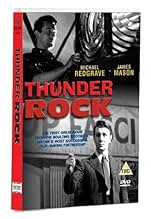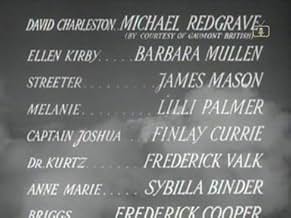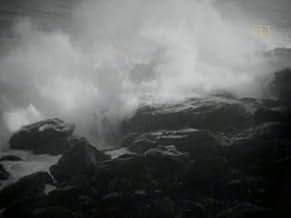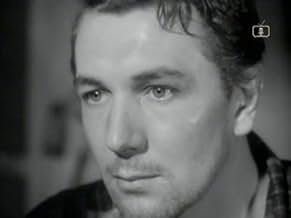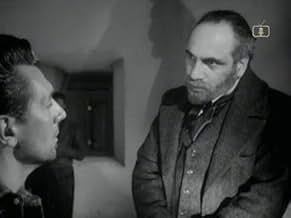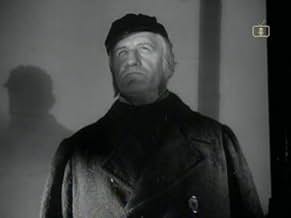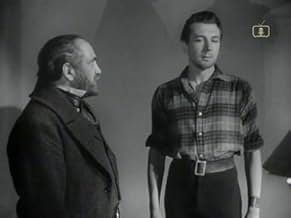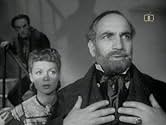Adicionar um enredo no seu idiomaCynical, embittered newspaperman David Charleston (Michael Redgrave) is tormented, then inspired, by visions he keeps having of people who have drowned.Cynical, embittered newspaperman David Charleston (Michael Redgrave) is tormented, then inspired, by visions he keeps having of people who have drowned.Cynical, embittered newspaperman David Charleston (Michael Redgrave) is tormented, then inspired, by visions he keeps having of people who have drowned.
- Direção
- Roteiristas
- Artistas
- Prêmios
- 1 vitória no total
Bryan Herbert
- Flanning
- (as Brian Herbert)
Avaliações em destaque
When the authorities discover a lighthouse keeper is not cashing his paychecks, they go to visit him to make sure he is OK. One of the visitors gets into a chat with the lighthouse keeper, David Charleston and discovers that his desire to stay in the lighthouse is based on the fact that he is in contact with the ghosts from a ship that sunk many years ago; although the ghosts do not know they are dead. Charleston hides away - having been frustrated by those in power ignoring his warnings about fascism. However he finds that each passenger has had similar experiences that he, with the benefit of future knowledge, can learn from.
The point of this film is both obvious but also too obscure. The message of not giving up is laboured at the end, but for the majority of the film, it is hidden and damages the early meaning of the film. The pre-war setting is a morale boosting tale of sticking at it - for we never know what tomorrow will bring; it delivers a reasonable tale but I found it hard to get into the stories of the various passengers as they were not characters I was given a lot of time to get into and care about. The stuff with Charleston himself works better as I cared about him due to the time spent with him.
The film is very stagy however, it doesn't really flow very well at times and the best scenes are played out as if in a theatre. It is rather heavy at times but it still works if you know what to expect. The cast is OK but really it is all Redgrave's film. He exaggerates his performance as if he is on a stage and needing to project to the back row, but he is still very good. Mason has a minor role but always has such a good presence that it is hard to fault him. The support cast of passengers is less assured and really never get close to being real people - instead their dialogue and stories are too heavily laden with meaning.
Overall this is a reasonably good propaganda. It has more meaning and human pathos than most WWII propaganda films as it is not anti-enemy but pro-spirit and persistence. It may all be a little heavy and too stagy but it is enjoyable if you can do enough to get past the heavy message and some overly worthy acting.
The point of this film is both obvious but also too obscure. The message of not giving up is laboured at the end, but for the majority of the film, it is hidden and damages the early meaning of the film. The pre-war setting is a morale boosting tale of sticking at it - for we never know what tomorrow will bring; it delivers a reasonable tale but I found it hard to get into the stories of the various passengers as they were not characters I was given a lot of time to get into and care about. The stuff with Charleston himself works better as I cared about him due to the time spent with him.
The film is very stagy however, it doesn't really flow very well at times and the best scenes are played out as if in a theatre. It is rather heavy at times but it still works if you know what to expect. The cast is OK but really it is all Redgrave's film. He exaggerates his performance as if he is on a stage and needing to project to the back row, but he is still very good. Mason has a minor role but always has such a good presence that it is hard to fault him. The support cast of passengers is less assured and really never get close to being real people - instead their dialogue and stories are too heavily laden with meaning.
Overall this is a reasonably good propaganda. It has more meaning and human pathos than most WWII propaganda films as it is not anti-enemy but pro-spirit and persistence. It may all be a little heavy and too stagy but it is enjoyable if you can do enough to get past the heavy message and some overly worthy acting.
All the reviewers who wished they could see this film again (some of whom saw it originally in 1942!), can now see it again if they are resident British and subscribe to Freeview tv on Channel 81 It is shown regularly on this wonderful channel which I constantly watch if you can put up with the adverts which finances it, as it saves paying for numerous dvds which I used to do before I discovered this tv station.For example, every Sunday @ 9.p.m. GMT they are repeating the wonderful mid 60s episodes of "The Human Jungle" starring Herbert Lom which I originally saw when it was transmitted (I am now 72).
Some reviewers thought Thunder Rock was too stagey.Does it matter? I saw the classic R.C.Sherriff's "Journey's End" on Youtube the other day which of course is based on his play.What if Michael Redgrave is a bit declamatory at times, he was an accomplished stage actor first.In 1942 Britain was in a precarious position so of course the Government sought propaganda films to help morale & the war effort.See this film on the aforesaid channel, the tv station is bound to repeat it occasionally.
Some reviewers thought Thunder Rock was too stagey.Does it matter? I saw the classic R.C.Sherriff's "Journey's End" on Youtube the other day which of course is based on his play.What if Michael Redgrave is a bit declamatory at times, he was an accomplished stage actor first.In 1942 Britain was in a precarious position so of course the Government sought propaganda films to help morale & the war effort.See this film on the aforesaid channel, the tv station is bound to repeat it occasionally.
That this story is an allegory is clear from very early on but the director seems to have wanted to disguise it somehow with unnecessary padding. In doing so he detracts from the overall message and loses his audience a little along the way. Take the opening scenes as an example where a phone call is passed higher and higher through a chain of employees. It's well played, well acted and amusing and of absolutely no relevence whatsoever to the plot. You may as well have had a Donald Duck Cartoon instead and started the film where James Mason lands at the lighthouse.
It achieves some great moments both in and out of it's lighthouse setting, Michael Redgrave is very good but everything just goes on that little bit too long for it's own good.
James Mason stardom puts him near the top of the billing, but he's really only a bit player in this and doesn't make any significant contribution to the overall film.
It achieves some great moments both in and out of it's lighthouse setting, Michael Redgrave is very good but everything just goes on that little bit too long for it's own good.
James Mason stardom puts him near the top of the billing, but he's really only a bit player in this and doesn't make any significant contribution to the overall film.
First of all, THUNDER ROCK is a psychological drama, but the film has very much hidden beneath its surface. This film comes disguised as a rather peculiar fantasy tale, but the truth is that it deals with reincarnation, a fact that's already revealed in the first scenes: A message is passed on by telephone from one office clerk to another, and to another and another. Like knowledge that is transmitted from one life to another.
David (Michael Redgrave) who is living completely on his own in a secluded lighthouse, finds a logbook with an old passenger list. This allows him to tune into his subconscious mind to open up the memories of his past lives. The drowned people, "immigrants from the old world": Each one of them represents a part of David's character. Each one of them could have been a person he once was in a former life. If you believe in reincarnation, this is a film you must see. However, Michael Redgrave is superb and so is the rest of the cast in this beautifully photographed film classic.
David (Michael Redgrave) who is living completely on his own in a secluded lighthouse, finds a logbook with an old passenger list. This allows him to tune into his subconscious mind to open up the memories of his past lives. The drowned people, "immigrants from the old world": Each one of them represents a part of David's character. Each one of them could have been a person he once was in a former life. If you believe in reincarnation, this is a film you must see. However, Michael Redgrave is superb and so is the rest of the cast in this beautifully photographed film classic.
I saw this movie in 1942, when I worked for the War Department and had just enlisted in the Army Air Corps, so this might account for the strong memories I have of it.
I was a little shocked that it seemed almost pure propaganda. However, it was clearly made for a British audience at a time when the nation was in imminent danger of invasion by the Nazis. Its message was never to give up hope.
It opens with the hero being frightened by the spread of Fascism across Europe. He goes into a London movie house where the depressing newsreel is followed by a cartoon which the unthinking audience finds hilarious. Disgusted, he gives up and withdraws into himself. He becomes a sort of hermit and somehow gets a job as a lighthouse-keeper on the Great Lakes.
Browsing through the lighthouse's log, he finds an account of a shipwreck. As he reads, the viewer notices that the lighthouse's central pole is now at an angle--a very clever hint of the transition to the fantasy now taking place. He is now on board the sinking ship and all is confusion and despair. But it turns out OK--the first example of the message (to the English) not to give up hope.
There are several other such episodes including one about the doctor in Vienna who discovers that doctors not washing their hands is how the deadly childbirth fever infection is spread. A failure, he is laughed out of town. But a few years later his radical theory is proved correct. Another morale boost for the discouraged wartime English.
I can't remember how the movie ends--but I've never forgotten the movie!
I was a little shocked that it seemed almost pure propaganda. However, it was clearly made for a British audience at a time when the nation was in imminent danger of invasion by the Nazis. Its message was never to give up hope.
It opens with the hero being frightened by the spread of Fascism across Europe. He goes into a London movie house where the depressing newsreel is followed by a cartoon which the unthinking audience finds hilarious. Disgusted, he gives up and withdraws into himself. He becomes a sort of hermit and somehow gets a job as a lighthouse-keeper on the Great Lakes.
Browsing through the lighthouse's log, he finds an account of a shipwreck. As he reads, the viewer notices that the lighthouse's central pole is now at an angle--a very clever hint of the transition to the fantasy now taking place. He is now on board the sinking ship and all is confusion and despair. But it turns out OK--the first example of the message (to the English) not to give up hope.
There are several other such episodes including one about the doctor in Vienna who discovers that doctors not washing their hands is how the deadly childbirth fever infection is spread. A failure, he is laughed out of town. But a few years later his radical theory is proved correct. Another morale boost for the discouraged wartime English.
I can't remember how the movie ends--but I've never forgotten the movie!
Você sabia?
- CuriosidadesBarbara Mullen (Ellen Kirby) was playing a forty-year-old spinster, yet, she was only twenty-eight.
- Erros de gravaçãoDuring the flashback sequence, when "Briggs" walks back into the room to his family, a crew member's hand can be seen outside the door stopping it from slamming shut.
Principais escolhas
Faça login para avaliar e ver a lista de recomendações personalizadas
Detalhes
- Data de lançamento
- País de origem
- Idioma
- Também conhecido como
- The Charter Film Production of Thunder Rock
- Locações de filme
- D&P Studios, Denham, Uxbridge, Buckinghamshire, Inglaterra, Reino Unido(studio: made at D & P Studios Denham - England)
- Empresa de produção
- Consulte mais créditos da empresa na IMDbPro
- Tempo de duração
- 1 h 52 min(112 min)
- Cor
- Proporção
- 1.37 : 1
Contribua para esta página
Sugerir uma alteração ou adicionar conteúdo ausente

